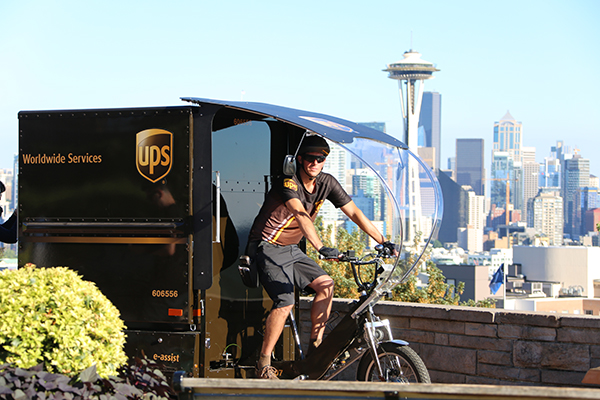
By Jeff Berman
UPS is taking its delivery processes to the streets. While that does not sound like anything major in itself, it comes with a caveat in that it is taking delivery to the streets on two bicycle wheels, rather than the customary four via its much more commonly used delivery trucks and vans.
This is happening through a partnership between UPS and the City of Seattle, Washington, which was announced last week, in the form of a downtown Seattle delivery pilot with pedal-assist cargo e-Bikes and customized modular trailers. UPS said these bikes will deliver packages in Seattle’s Pike Place market, as well as downtown Seattle on sidewalks and in designated bike lanes, too.
Kristen Petrella, UPS spokeswoman, told LM that this endeavor in Seattle is a great example of public/private collaboration.
“Seattle city officials wanted innovative solutions to help reduce carbon emissions and address traffic congestion, noise and air quality challenges,” she said. “We worked closely with officials to design a cargo eBike that helps the city and UPS address these issues.”
UPS developed its cargo eBikes in a partnership with Silver Eagle Manufacturing using Truck Tikes, explaining that the cargo eBike system will be comprised of removable cargo containers that are deployed via a specially designed trailer. It referred to it as a “plug and play” design that will provide greater flexibility to meet a wide range of delivery needs. And it also noted that it will be able to make deliveries to areas conventional delivery trucks can’t access directly and currently require that trucks be parked on the periphery for long periods of time.
Benefits of this cited by UPS include: reducing congestion in these areas by reducing truck dwell time; instances of double parking; and other unintended consequences associated with downtown deliveries.
UPS added that these bikes are equipped with a battery-powered electric motor that can travel longer distances than traditional bikes, carry substantial loads and navigate hills and other terrain, adding that the modular, detachable boxes on the trailer can hold up to 400 lbs. and have a 95 cubic foot capacity. What’s more, it noted that the bikes can be operated with human pedal power or battery power, providing drivers with the flexibility they need to navigate changing terrain and energy efficiency.
This impetus for this partnership stemmed from a collaboration between UPS and the Seattle Department of Transportation to develop plans for the pilot program. If it is deemed a success, UPS said it will take the next steps to expand the route and vet adding more cargo eBike deliveries in other areas of Seattle.
“The Puget Sound is also a hotbed for studies and innovation related to urban logistics, and sustainable urban logistics,” said Petrella. “UPS works with the University of Washington’s Urban Freight Lab, and UPS also is a member of the Seattle Department of Transportation’s Seattle Freight Advisory Board. With groundbreaking talent all focused on similar issues in the same geography, we knew that Seattle would be a perfect city to launch UPS’s cargo eBike. We’re pleased we could bring this latest innovation to Seattle, which is where UPS began as the American Messenger Company in 1907, as a bike delivery company. We’re finding interest for projects like this in cities across the country and look forward to working with other cities to help them solve their logistics needs.”
As for the initial steps of the pilot program, Petrella said said it will go on for at least six months, with the potential to last for a year, adding that it will kick off with with cargo eBike involved.
The pilot bike will support UPS’s delivery needs Pike Place Market area from south Belltown to the southern end of the market, inclusive of Western Avenue. The trailer with cargo boxes will be parked near the corner of 4th and Battery St. All customers in this area will be serviced by the eBike, she noted, adding that UPS does not have a count of the number of UPS staffers involved but many have touched this project.
In terms of the customer benefits this pilot program provides, Petrella pointed to how this model of customizable, modular cargo boxes could have major implications nationwide.
“This solution will help cities lessen carbon emissions as well as noise, air quality and congestion issues,” she said. “We’re finding interest for projects like this in cities across the country and look forward to working with other cities to help them solve their logistics needs.”
Seattle Mayor Jenny A. Durkan issued an enthusiastic endorsement of this initiative.
“Seattle has always been the city that invents the future, and now we are partnering with one of our hometown companies to help drive innovations in transportation,” said Durkan in a statement. “As Seattle grows and public and private megaprojects limit capacity on our downtown streets, this pilot will help us better understand how we can ensure the delivery of goods while making space on our streets for transit, bikes, and pedestrians. We are eager to learn how pilots like these can help build a city of the future with fewer cars, more transit and less carbon pollution.”